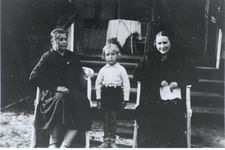 Juris, and Elly, too, were born in Latvia, though they didn't know each
other until they came to the U.S. Here's an early picture of Juris, with
his mother on his left.
Juris, and Elly, too, were born in Latvia, though they didn't know each
other until they came to the U.S. Here's an early picture of Juris, with
his mother on his left.
| Date: 05 May 2001 | Occasion: Hartmanis Retirement | Place: Cornell University |
On the Occasion of
the Retirement of
Juris
and Elly Hartmanis
David Gries
6 May 2001
It's Juris, the man of the hour 'Twas his vision and leadership true
And Elly, the one with the power And her insight and helpfulness too
Without him at the top That made CS@Cornell
And her backing him up A great place to dwell
CS at Cornell would be sour Yes, we're lucky to have both you.
Yes, indeed. It was Juris, the first
chair of CS --or his wife-- who gave it its vision and, in his own inimitable,
informal, but extremely effective leadership style, lead the department
to become one of the great CS departments.
But let me start at the beginning, or at least as close to it as I can. I think there is a lot about the life of these two that most people don't know, and you will appreciate them more when learn more.
Juris comes to America
 Juris, and Elly, too, were born in Latvia, though they didn't know each
other until they came to the U.S. Here's an early picture of Juris, with
his mother on his left.
Juris, and Elly, too, were born in Latvia, though they didn't know each
other until they came to the U.S. Here's an early picture of Juris, with
his mother on his left.
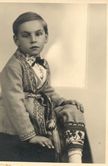 Hereís a picture of Juris, taken when he was about seven. Just look
at him. You can tell from the clothes and the haughty look that he felt
he was nobility. In fact, his father was a high-ranking Latvian general.
Jurisís real name was not Hartmanis but Picupaandropov, a name that
will come into this story later.
Hereís a picture of Juris, taken when he was about seven. Just look
at him. You can tell from the clothes and the haughty look that he felt
he was nobility. In fact, his father was a high-ranking Latvian general.
Jurisís real name was not Hartmanis but Picupaandropov, a name that
will come into this story later.
Juris had an easy early life, and he wouldn't
have become such a great scientist, if it hadn't been for World War II.
Some good, at least for us, came of that war. It drove him out of Latvia
--ahead of the advancing Russians-- and to the U.S. On the way, he paused
in Germany and picked up a physics degree from the University of Marburg.
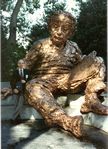 That probably had something to do with his love of Einstein. Sierra, his
granddaughter (about 6 years old), told me that Juris "cherishes" Einstein.
She also told me that Einstein didn't speak at all, as a child, until he
could speak in full sentences. Juris still doesn't speak in full sentences.
That probably had something to do with his love of Einstein. Sierra, his
granddaughter (about 6 years old), told me that Juris "cherishes" Einstein.
She also told me that Einstein didn't speak at all, as a child, until he
could speak in full sentences. Juris still doesn't speak in full sentences.
Looking for a bit more adventure, Juris came to the U.S. and landed in, of all places, Kansas. He didn't have much money, so he took the only job he knew he could handle: as a chauffeur. What set him on this? As a youngster, when the other generals came in their chauffeured limousines to meet with his father, the chauffeurs would sit and chat together. Meanwhile, Juris would slip into a limo and drive it around. One of his good friends, his father's chauffeur, probably had a watchful eye on him.
So, when penniless and hungry Juris Picupaandropov saw the advertisement for this job of chauffeur in Kansas City, he knew it was for him. He applied for it in person, and, trying to sound American, said, "I apply for zis job of chauffeur. My name is PickUpAndDropOff." Needless to say, he got the job.
You can imagine that as soon as Juris became more savvy, he changed his name from Picupaandropov to Hartmanis.
This is an aside. At this point, you are wondering whether anything I am saying about Juris is for real. Some of it is, and some isn't. From now on, I'll wink at you when I am stretching the truth.
After getting his Master degree at Kansas, Juris's applied and was accepted into the math Ph.D. programs at Kansas, Nebraska, and Cal Tech. In typical Juris fashion, he chose the right place for the wrong reason. He went to Cal Tech simply because they of-fered him $90 in travel expenses!
Ellyís flight from Latvia
One thing that we all never knew, or forgot, was the hardship that Juris and Elly went through, because of World War II. They rarely, if ever, talk about it. I think it is admirable how they survived and thrived after the war. One day, near the end of the war, Jurisís father just disappeared, never to be seen again, and he and his family fled Latvia, trying to stay out of the hands of the Russians. It is difficult for those of us who have lived in this land of plenty all our lives to understand what they went through. We simply canít imagine what it would be like to be completely uprooted, to have to leave home and family, and not know where part of the family was, much less where the next meal was coming from.
Well, they say that God never gives you more than you can tolerate, which is a good reason to have a low telerance.
Ellyís experiences were no better. Her family also fled Latvia and, at the age of ten, she and her family were in a refugee camp for several months in what is now Poznan, in Poland. They were then moved to Berlin, in about 1945, and then Hanover, still as refugees.
Elly learned English in an interpreterís school, took several jobs where she used English, and ended up as secretary to the Catholic Relief Organization, which worked to settle 8 million refugees in Canada, US, New Zealand, and other places.
After settling 8 million people, Elly and her mother moved to the U.S., in, of all places, Minnesota. It was there that she met Juris's sister, Astrid. Astrid, throughout her life, has shown more sense and intelligence than Juris. For example, she is a vegetarian.
Not particularly liking Minnesota, Elly and her mother decided to try California, and Pasadena seemed like a good place. They would know someone there, at least, Astridís brother. Elly bought a car, learned to drive --note the order of these--, and drove off with two friends, her mother going on ahead by plane. The first night in LA, with no money, Elly and her girl friend climbed a fence, jumped into some rich man's pool, and slept under some bushes. Having lived a refugeeís life in Europe for many months, this didnít phase Elly at all! The next day, they managed to meet her mother and Juris in a Pasadena park for a picnic.
Juris, the stud; Elly, the glamour girl
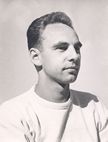 Here ís a picture of Juris from around that time! Here's the stud,
the hunk of virility. Doesn't he look handsome and clean? Could have been
a lifeguard, or a sports star.
Here ís a picture of Juris from around that time! Here's the stud,
the hunk of virility. Doesn't he look handsome and clean? Could have been
a lifeguard, or a sports star.

 Of course, had he grown up in the U.S., and just a few years later, he
could have had an entirely different life.
Of course, had he grown up in the U.S., and just a few years later, he
could have had an entirely different life.
Can't you imagine Juris as a rock star?
Well, I like him better in the clean-cut
look.
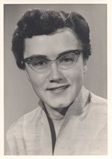 And here ís Elly at close to the same age.
And here ís Elly at close to the same age.
Can't you see how he fell for her?

 But especially you young people, I want you to look carefully at Juris
then. Many of you also feel handsome and all, but look at him now. Look
at that silly smile, a touch of senility setting in, reverting back to
childhood, playing with toys! At a young age, we think we are invincible,
and see what happens to us! Let this be a lesson to you. It's not your
bodies that are important, but your character. Thatís what people
will remember you for. Juris and Elly are prime examples of people whose
characters got younger and better as they grew older. We are here to celebrate
not their retirement but the way they have touched all our lives, because
of the way they were on the inside, not the outside.
But especially you young people, I want you to look carefully at Juris
then. Many of you also feel handsome and all, but look at him now. Look
at that silly smile, a touch of senility setting in, reverting back to
childhood, playing with toys! At a young age, we think we are invincible,
and see what happens to us! Let this be a lesson to you. It's not your
bodies that are important, but your character. Thatís what people
will remember you for. Juris and Elly are prime examples of people whose
characters got younger and better as they grew older. We are here to celebrate
not their retirement but the way they have touched all our lives, because
of the way they were on the inside, not the outside.
The courtship
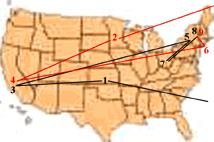 That fateful day on a picnic in Pasadena started the romance, which actually
took some time to reach fruition. Let's look briefly at their travels in
the U.S.
That fateful day on a picnic in Pasadena started the romance, which actually
took some time to reach fruition. Let's look briefly at their travels in
the U.S.
(1) He starts out in Kansas.
(2) She starts out in Minnesota.
(3) He goes to California.
(4) She goes to California and they meet.
(5) He takes his first job at Cornell,
as far away from her as he can get.
(6) She works for a stockbroker in New
York City to be closer to him.
(7) He goes to Ohio, getting a bit further
away. She says, "Look, PickUpAndDropOff; that's enough of this running
around; we're getting married --or I'll drop-off you like a stone in the
river and pickup someone else." So,
(8) he takes a job with GE in Schenectady
and
(9) she comes too and they get married
and they live happily ever after!
Actually, they were so enamoured of US
life, particularly the movies and musicals and all, that they sung to each
other at this time (to the tune of "I am sixteen going on seventeen").
Listen carefully to this. (Thanks, Dexter Kozen, for accompanying me on
the guitar.)
I am 28, Elly dearest, destined to live with you,
Let us not tarry, let us get married, we have a lot to do.
I will work at GE, Schenectady, weíll have a family soon.
A son and a daughter, Martin, Reneta, maybe, an Audrey, too.
Gone are the days of poverty, brought on by World War II,
Here in the U.S., luxury is meant for me and you!
I am 28, I am getting old, I need to settle down,
Live a life of ease and comfort, with you to call my own.Juris, yes, I'll marry you but, your sights are set too low.
Home is okay but youíre destined for more, a Turing you must go!
GE is fine to start but weíll move if Iím to be your mate.
Schenectady is too close to Troy, that armpit of New York State!
I need a Ph.D. Environments, and you could use one too.
Weíll move to academia, perhaps to Cornell U.
Not only family but computer science, I have a vision for you.
Stick with me and become famous, Juris, I do-o, love you!


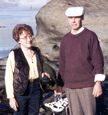
 So, they got married, raised a family
So, they got married, raised a family
(from right to left, that's Reneta and Juris and Audrey;
then Audrey, Juris, and Reneta;
then Juris and Elly, and
then Juris, Audrey, Audrey's children Kenzie
and Sierra, and Martin),
 Did some great research at GE with Dick Stearns and Phil Lewis, and others
(the other one in the pictures is Dick Stearns).
Did some great research at GE with Dick Stearns and Phil Lewis, and others
(the other one in the pictures is Dick Stearns).
came to chair CS@Cornell.
You know the rest!
Jurisís perception and vision
Over the years, Juris has been more perceptive about just about everything than the rest of the faculty. He had a better sense of what the department needed, and he knew how to get it. I remember in the late 1970's, when he was on sabbatic. We senior faculty got together and talked about the fact that the department did not need to grow. We were the right size; there was no need to add more faculty. We even told that to Dean Everhart! Juris returned, heard what we had said, and just laughed at us. The field will grow tremendously, he said, and he reversed our statement to the Dean, and we added more faculty. Just in time for the next swell of new students.
I can remember another time where Juris displayed far more perception than the rest of us. Way back in the early 1970s, we had a retreat to discuss the department's direction. We actually spent a night at a place that Cornell had in the woods, but it turned out that, because of overbooking, we had to spend the night in a tent. A luxurious tent, but still a tent. We grumbled, but did it.
In the middle of the night, Juris woke us up and asked us to look up. "Do you all see the stars up there? "What does it mean? What does it tell you?"
Gerry Salton blurted out immediately, "The position of the stars and constellations tells me that we are not at Harvard. I am going back to sleep."
John Hopcroft was next. "There's not a cloud in the sky, and that constellation there seems to be blinking. From this one data point a lot can be inferred! I now know how to set priorities for the department, and the College of Engineering. I see a vision for Cornell, and ...
"Stop," said Juris. "Enough! Constable, what do you infer from our ability to see the sky?
"Well," pondered Constable. "It sure makes you think about the millions of galaxies and billions of stars and planets; I wonder whether they are recursively enumerable. All sorts of recursive questions could be asked about that sky. I canít answer without pondering deeply and perhaps discussing it Kleene."
Dick Conway, always the engineer and sailor, grumbled about not having his sextant with him, for measuring the altitudes of some of the stars. With them, he could set out for home now, and sand the keel of his boat some more, and not have to listen to any more of this.
Meanwhile, I had been on my cell phone, asking questions of Elaine, my wife, so I was ready. "The sun is in Scorpio and the Moon is in Taurus. Itís a good time to start an undergraduate program, and a man will come into your life today, but be wary of the financial situation."
We then all turned to Juris, clamoring, "What does it tell you?"
Juris was silent for a moment. Then, he said, "you idiots, all of you. The fact that we can see the sky means that someone has stolen our tent."
Faculty coffees
In the old days, one of the things that distinguished CS@Cornell from EVERY other CS department was the faculty coffee. Everyone went to lunch and then to coffee --well, Gerry Salton missed lunch, but he did show up for coffee. It was a tradition, well entrenched and famous, or, in some circles, infamous. We never had faculty meetings, and we had very few committees. They simply werenít needed. Sensing a problem, Juris would bring it up at coffee. We would discuss it for a few days; Juris would get the lay of the land; Juris would make a decision; and Juris would ask one or two people to take care of the situation in some way.
No committees! No dreary faculty meetings! Everyone had a voice. There was consensus building, which creates trust, instead of voting, which creates losers and winners and distrust. Everyone won. Juris was the benevolent dictator, and we trusted his leadership and vision --or Elly's vision-- because he really did work for the good of the department.
I donít know whether Juris was responsible
for the coffee tradition, but he acted as if he was. He had his seat, and
from there he would hold forth. The seat often remained empty if Juris
wasnít there, because whoever sat in it had to act like Juris! Juris
chose the topic, and Juris led the conversation. Be it about department
business, grilling a recruit, pumping a visitor for news about their department
(I think the pumping lemma had something to do with Juris and our coffee
hour), a Cornell issue, politics, world news, or sports.
Ah yes, sports was often hot topic of
conversation! I made the mistake of bringing my father to coffee one Monday.
As a student at Columbia, a classics major, my father graduated summa cum
laude --whatever that means. He got all A+s but had to have a special dispensation
to get through physical education, which he failed. He was a Classics Professor,
and a good one, and never did sports, except for swimming.
As I said, I made the mistake of bringing my father to the department coffee on a Monday, just after an exciting, sports-filled, weekend. Tennis, soccer, football, all sports were important that weekend. With Juris leading the way, sports was the only topic discussed, and my father was ignored! On the way home that day, my father commented,
I didn't know grown men talked about sports that way!
Unanswered
questions
Well, itís about time to wrap this up, because others want to have their say. Let me end by stating some questions that I asked myself when I first began thinking about what to say at this banquet. They were easy questions to ask, but difficult to answer eloquently, as youíll see.
1. How do you review the career of a person who co-created an important area that spans CS and math, who was one of the most renowned and continuous contributors to that field for over 30 years, who won the highest research award in computer science, but who NEVER wrote a computer program and ran it on a computer to check it out? Answer: Better not try!
2. How do you talk about a person who would have been "Statesman of the Year" several times, if there were such an award, for his work on national and university committees, on review teams of uncountable computer science departments, on countless program committees, and as an Assistant Director of the NSF? Answer: You don't!
3. How do you characterize, review, and comment on a person who started a CS department and soon had it ranked number 5, where it still is after 35 years, who was Department Chair not once but three times, each time providing a fresh outlook and vision, and each time with the trust and support of all the faculty? Answer: There is no need to; the record speaks for itself.

 4. How do you thank this man and his family for all they did in the
early days to promote a sense of togetherness within the department, making
newcomers feel welcome, helping families of newcomers, organizing social
activities and such? Answer: You thank them with all your
heart, for that sense of belonging, which we really had in those days,
meant so much to us.
4. How do you thank this man and his family for all they did in the
early days to promote a sense of togetherness within the department, making
newcomers feel welcome, helping families of newcomers, organizing social
activities and such? Answer: You thank them with all your
heart, for that sense of belonging, which we really had in those days,
meant so much to us.
5. How do you comment on a relationship between this talented person and his equally talented wife, who combined real artistic qualities with business acumen in her own business, Ph.D. Environments? Answer: You don't; you just look on with amazement.
6. Finally, could CS@Cornell have thrived the way it did without Juris and Elly? Could the faculty and students have grown and functioned in the same way, making this Department a shining light not only within CS at large but within the Engineering School, Arts & Sciences, and Cornell? Answer: It is possible. I mean, it's not that the rest of the faculty were slouches, and this Department has never had deadwood.

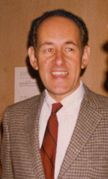
 Dick Conway (in the far left picture), a member of ORIE, and Bob Walker
(also in the far left picture), from Mathematics, were instrumental in
starting the Department. The late Gerry Salton (in the picture to the right)
came to the Department in 1965 with Juris, from Harvard. John Hopcroft
(in the near left picture) came to the Department in 1967.
Dick Conway (in the far left picture), a member of ORIE, and Bob Walker
(also in the far left picture), from Mathematics, were instrumental in
starting the Department. The late Gerry Salton (in the picture to the right)
came to the Department in 1965 with Juris, from Harvard. John Hopcroft
(in the near left picture) came to the Department in 1967.


 Bob
Constable (that's him in the far left picture, with Juris and Howard Morgan)
came in 1968, and David Gries (in the far right picture, with Juris Hartmanis)
came in 1969. And then there are all the newer people, like Tim Teitelbaum,
Charlie Van Loan (the current Chair), Fred B. Schneider, Tom Coleman, Dexter
Kozen, Joe Halpern, Ken Birman, and so on. Non are slouches, and all have
all made their own marks on computer science.
Bob
Constable (that's him in the far left picture, with Juris and Howard Morgan)
came in 1968, and David Gries (in the far right picture, with Juris Hartmanis)
came in 1969. And then there are all the newer people, like Tim Teitelbaum,
Charlie Van Loan (the current Chair), Fred B. Schneider, Tom Coleman, Dexter
Kozen, Joe Halpern, Ken Birman, and so on. Non are slouches, and all have
all made their own marks on computer science.
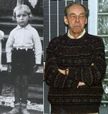
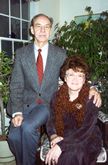 So, Cornell COULD have functioned without Juris and Elly. But Juris and
Elly helped bring all these people here! And, with Juris and Elly, we were
far better off. CS@Cornell was just a better, fuller, richer, happier place
to be. These two have dug themselves deep into our memories, and the effects
cannot be easily erased, no matter how much we wanted to. They were a big,
important part of the climate that permitted CS@Cornell to become
what it has become. Juris and Elly, thank you!
So, Cornell COULD have functioned without Juris and Elly. But Juris and
Elly helped bring all these people here! And, with Juris and Elly, we were
far better off. CS@Cornell was just a better, fuller, richer, happier place
to be. These two have dug themselves deep into our memories, and the effects
cannot be easily erased, no matter how much we wanted to. They were a big,
important part of the climate that permitted CS@Cornell to become
what it has become. Juris and Elly, thank you!
Context and Acknowledgements
This web presentation was based directly on Gries'es after-dinner talk at the banquet of the retirement conference for Juris Hartmanis, 5 May 2001. The after-dinner talk would not have been possible without a lot of help from Audrey Hartmanis, Reneta Hartmanis, and Cindy Robinson. Thanks also to Dexter Kozen for much help and for accompanying Gries on the guitar. And to Juris Hartmanis, whose retirement made this after-dinner talk possible.